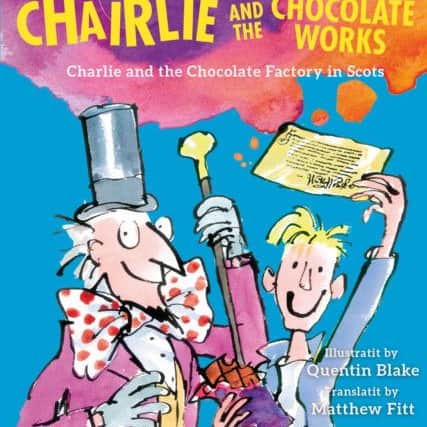Charlie and the Chocolate factory to be translated into Scots


Novelist Matthew Fitt translated the children’s classic because there are too few books for young Scots to read in their own language.
Scots is a West Germanic dialect spoken in Scotland.
It was the language of the medieval Scottish court, spoken by Mary Queen of Scots and James VI.


Now there are 1.6 million speakers of Scots.
Advertisement
Hide AdAdvertisement
Hide AdAlthough Roald Dahl’s works have been translated into 58 different languages worldwide, this will be the first time the book has been available in Scots.
The 47-year-old from Dundee said: “Without Scots, Scotland would be a less distinct and a less creative place.
“But the 2011 Census recorded 1.6 million speakers of the Scots language. So it’s in a fairly healthy state.


“The problem is there are too few books available to read in Scots.
“Translating children’s classics into Scots has got huge numbers of young readers in Scotland reading in their own language, which was never the case before.”
Though the new book keeps the famous Quentin Blake illustrations, some of the famous names have been revamped.
Willy Wonka’s famous factory workers, the Oompah-Loompahs, become Heedrum-Hodrums.
Advertisement
Hide AdAdvertisement
Hide AdViolet Beauregarde becomes Violet Boakregarde and Willy Wonka’s chocolate rivals are named in Scots as ‘Mucklegubber, Skelpneb and Lugmince’.
Charlie Bucket, in the original, becomes Chairlie Baffie - off on the “adventure o a lifeteime” when “Mr Wullie Wonka invites five bairns ben intae his warld-famous chocolate factory, some o them turn oot tae be spoilt wee bampots”.
Like Dahl, Fitt enjoyed playing around and inventing new words.
He said: “I try to find funny Scots equivalents of Dahl’s original names and like Dahl I aim to invent new Scots words that (hopefully) make young readers laugh their heids aff.”
Fitt said he enjoyed translating the book, but it was made harder by his five-year-old daughter nagging him.
He said he translated the book: “In my house with my five-year-old running round me chanting ‘Oompah, loompah, doom-pa-dee-doo’ asking me over and over when I was going to finish it.”
The novelist and poet chose the Roald Dahl classic because it was his favourite.
Advertisement
Hide AdAdvertisement
Hide AdHe said: “It’s an honour to be the first to translate it into Scots.
“His writing is edgy, anarchic and just pure gallus.
“And the knockabout humour together with the often dark morality of his stories make Roald Dahl’s work perfect for translating into Scots.”
Fitt has already translated other Roald Dahl favourites, including The Twits, which became The Eejits.
His publishing company, Itchy Coo Books, are about to publish Julia Donaldson’s The Gruffalo’s Child in Scots and a Scots version of Asterix and Cleopatra is also in the works.